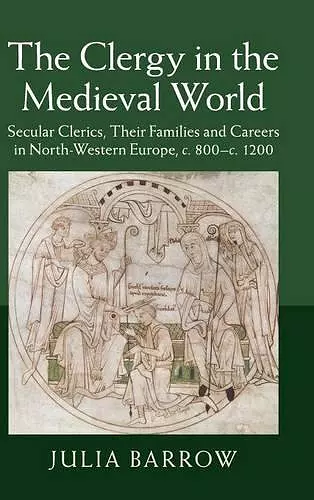The Clergy in the Medieval World
Secular Clerics, their Families and Careers in North-Western Europe, c.800–c.1200
Format:Hardback
Publisher:Cambridge University Press
Published:15th Jan '15
Currently unavailable, and unfortunately no date known when it will be back
This hardback is available in another edition too:
- Paperback£30.99(9781107451308)

The first broad-ranging social history in English of the medieval secular clergy.
Unlike monks and nuns, clergy have hitherto been sidelined in accounts of the Middle Ages, but they played an important role in medieval society, in pastoral care, education and administration. This book examines how clerics built up their careers, and identifies the principal factors influencing their advancement.Unlike monks and nuns, clergy have hitherto been sidelined in accounts of the Middle Ages, but they played an important role in medieval society. This first broad-ranging study in English of the secular clergy examines how ordination provided a framework for clerical life cycles and outlines the influence exerted on secular clergy by monastic ideals before tracing typical career paths for clerics. Concentrating on northern France, England and Germany in the period c.800–c.1200, Julia Barrow explores how entry into the clergy usually occurred in childhood, with parents making decisions for their sons, although other relatives, chiefly clerical uncles, were also influential. By comparing two main types of family structure, Barrow supplies an explanation of why Gregorian reformers faced little serious opposition in demanding an end to clerical marriage in the eleventh and twelfth centuries. Changes in educational provision c.1100 also help to explain growing social and geographical mobility among clerics.
'Julia Barrow's magisterial social history of medieval clergy brings into sharp focus many aspects of the medieval Church hitherto only vaguely understood. A previously fragmented field of study is synthesised as a unified whole, resting on deep and secure scholarship. It is a tremendously important book.' David d'Avray, University College London
'Julia Barrow has produced a master work that is at once engaging, important, learned, and original. Focusing on Continental Europe and the British Isles, Barrow has tackled the medieval clergy as a whole. Many works treat, say, monks and monasteries, or bishops and cathedrals. But no book has the breadth or depth of coverage that Barrow has achieved. Barrow is attentive to fundamental issues of continuity and change and to regional diversity. This book will be essential reading for medievalists and church historians. It is certain to be a reliable standard for a long time.' Thomas F. X. Noble, University of Notre Dame
'This is an impressive book, on a topic that should be well known but is not. It provides an expert overview of the clergy in a period that bridges four dynamic medieval centuries and many regions. It is also a social history that makes 'the Church' come alive, in all its human diversity.' Mayke de Jong, Utrecht University
'Clergy were central to medieval communities, but studies of them tend to be technical, specific, and obscure for non-specialists. Julia Barrow's thorough but admirably lucid overview is approachable at all levels. Historians will be stimulated by her broad-scale comparisons, and anyone interested in medieval society will find their understanding enriched.' John Blair, University of Oxford
'Professor Barrow's ambitious study of the clergy between c.800 and c.1200 provides an excellent framework for understanding the development of an important but surprisingly neglected group. Historians of medieval society and particularly of the medieval church will welcome this book, which provides a deeply researched and comprehensive overview of the subject but will also serve as the starting point for much future work.' Hugh M. Thomas, University of Miami
ISBN: 9781107086388
Dimensions: 229mm x 155mm x 33mm
Weight: 800g
470 pages